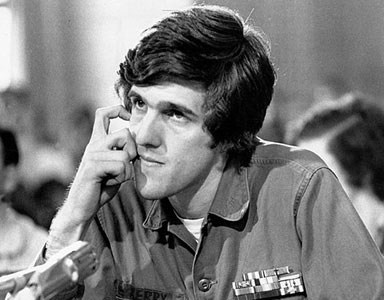[Primary Sources]
[Introduction] [Part I]
Part II: Antiwar Protester

John Kerry was thrust onto the national stage on April 22, 1971, in his famous testimony before the Senate Committee on Foreign Relations as a spokesman for the Vietnam Veterans Against the War (VVAW). This got the immediate attention of President Nixon:
Transcript of testimony before the Senate Committee on Foreign Relations, April 22, 1971. [C-SPAN]
Transcripts from the White House tapes, April 23, April 28, June 2, June 16, 1971 [MSNBC]
The political attack on Kerry's antiwar activities has its roots in William F. Buckley, Jr.'s commencement address at West Point, June 8, 1971. [National Review] Buckley used Kerry and the VVAW to promote his ideology of cultural division:
One of the most interesting documents in this is Kerry's debate with Buckley on Firing Line, taped on November 2, 1971. [Stanford] It aired on November 14, just days after Kerry had quietly resigned from his position in the VVAW, citing "differences in political philosophy." On Firing Line, among other things, Kerry saw Nixon's forthcoming trip to China as a "brave, bold gesture," while Buckley was against it even as American soldiers were being killed every day in Vietnam with large-scale material and logistical support from the Chinese.
[AP]
The trip gave birth to an American proverb, "Only Nixon could go to China." It is fair to ask, however, whether President Nixon would have gone to China if he had not listened to Vietnam veterans like John Kerry. Unfit for Command simply ignores history and treats the Vietnam war as if it took place on the moon:
This script was devised by the Nixon White House, and O'Neill opened with it and pressed it throughout his debate with Kerry in 1971. ["Debating Kerry"] It was built on the premise that there was no truth to the claims that Kerry made in his Senate testimony, which were based on the Winter Soldier Investigation. If the things that Kerry reported were true, then the argument falls apart. [Texas Tech]
Retired General Tommy Franks told the truth in a FOX television interview on August 3, 2004:
"The things that Senator Kerry said are undeniable about activities in Vietnam."
"I'm not sure that activities like that didn't take place. In fact, quite the contrary. I'm sure that they did." [Daily Howler]
Another basic reality of the Vietnam war that O'Neill and Corsi ignore is the lack of support for veterans coming home, especially those who did not remain in the fold of the military and returned to civilian life. Gene Thorson, who served with Kerry on PCF-94, put it this way:
"When we came back, we [were] shunned. ... [The leaders of the antiwar movement] at that time didn't really want the American vet in their organizations. I don't know—they thought we were a bunch of hooligans or what—they didn't think we'd done a proper job or what—I don't know. They didn't want us in their, uh, legion or whatever. ..." [Brothers in Arms]
Drew Whitlow, who served with Kerry on PCF-44, put it another way:
"He did what needed to be done. Us regular guys had just become pawns on a chessboard. We were treated like lepers, spat on. John brought us attention. He shed light on the lies of Vietnam. Before his speech most Americans had taken us for granted." [Brinkley, p. 373]